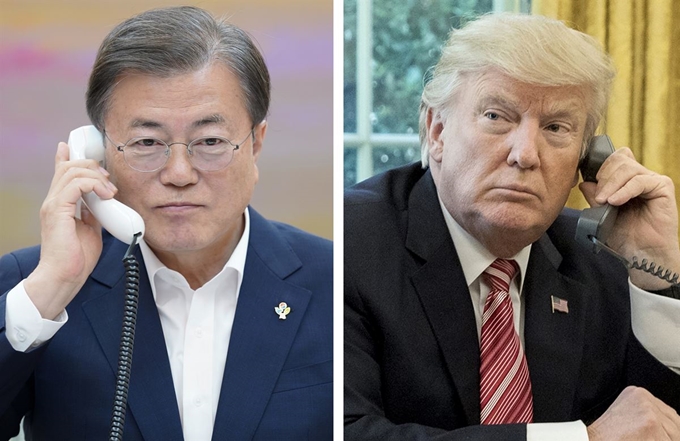
<6월 2일자 코리아타임스 사설>
Delicate balancing act required from South Korea
섬세한 균형 외교 감각이 필요하다
In the ever-shifting dynamics over trade, technology and the war on COVID-19, South Korea finds itself increasingly between the United States and China and having to ask itself if it will have to choose between the two. Such a prospect is not a desirable option for Korea, a country with the fourth largest economy in Asia and 12th largest in the world.
무역, 기술, 신종 코로나바이러스 감염증(코로나19) 퇴치에 있어서 계속 변화하는 역학 속에서 정부는 미국과 중국이라는 외교 파트너 중 한 나라를 선택해야 하는 상황에 놓이게 되는지 고심하고 있다. 이런 가능성은 아시아 경제권 4위, 세계 12위 국가인 한국에는 이상적인 옵션이 아니다.
On Saturday, U.S. President Trump as chairman of this year’s G7 summit said he would like to expand the meeting, and invited South Korea, Russia, India and Australia to join. He referred to the G7 as a “very outdated group” that does not reflect what is going on in the world.
지난 토요일, 이번 주요 7개국(G7) 정상회의 의장인 미국 대통령 트럼프는 G7을 확대하고 한국, 러시아, 인도, 호주를 초대한다고 했다. 트럼프 대통령은 현재의 G7은 ‘매우 시대에 뒤떨어진’ 그룹이고 세계 정세를 제대로 반영 못하고 있다고 했다.
The invitation itself was a pat on the back for South Korea and its inflated status in the fight against the COVID-19 pandemic.
미국의 초대는 특히 코로나19를 퇴치하는 데 성공적인 모습을 보인 한국에는 잘했다는 칭찬의 일환이다.
However, the invitation seems to come with a catch; the White House said that the extended summit would discuss the future of China among other things. That places Seoul in a challenging position to say the least. The rather noncommittal comment by Cheong Wa Dae that it was “aware” of the reports and that the matter is to be discussed with the United States in the future, veils Seoul’s full-throttle diplomatic calculations as to how to avoid such a scenario.
그럼에도 불구하고, 초대장에는 조건이 있는 듯해, 한국에는 부담으로도 작용할 수 있다. 백악관은 확대 G7 정상회의는 의제 중 하나로 중국의 미래에 대해 논의할 것이라고 언급했다. 그러한 “조건부”적인 사항이 아마도 청와대가 건조하게 “보도”된 내용을 봤고 미국과 향후 참여 여부를 논의할 것이라고 말하게 만들었을 것이다. (사설 보도 후, 문재인 대통령은 확대 G7회의에 참석할 것이라고 트럼프 대통령과의 전화 통화 후 밝혔다.)
The United States is Seoul’s partner in defense and security, and Korea’s second largest trading partner. It is also a pivotal partner in the Korea peace initiative where President Moon Jae-in has proactively mediated in U.S.-North Korea summits. China is Korea’s No. 1 trading partner with whom the Moon administration has been coordinating for President Xi Jinping’s visit. The Chinese president’s visit would provide a certain amount of resolution between Seoul and Beijing over the deployment of a U.S. anti-missile battery here in 2017.
미국은 한국의 방위, 안보 분야의 동맹으로서, 한국의 두 번째 통상 국가로서 그 중요성은 전통성이 있다. 문재인 대통령은 미북 정상회담을 중재할 정도로 미국의 전략적 파트너십을 중시한다. 중국은 주지하다시피 한국의 제1 통상 국가로서 정부는 시진핑 국가주석의 방한을 위해 노력하고 있다. 시 주석의 방한을 계기로 2017년 한중 간의 사드 배치 후 갈등 국면을 해소하고자 하기 때문이다.
A larger G7 summit is the latest issue escalating the Sino-U.S. war of nerves. From culpability over the virus outbreak, to jostling over trade and technology leadership, the two are also highly divided over a Hong Kong security law and Hong Kong’s special status. Seoul has been in this territory before; it is not a stranger to responding to equi-distancing challenges in diplomacy.
확대 G7 정상회의는 날로 극심해지는 미중 간 신경전에서 최근 상황이다. 코로나19 퇴치, 기술 패권, 홍콩 관련 안보법, 특별 지위에 관한 여러 사항에서 두 나라는 두루 부딪히고 있다. 하지만 등거리 외교라는 숙제는 한국에는 낯설지 않다. 예전에도 여러 번 부딪혔고, 극복했다.
It joined the Beijing-led Asian Infrastructure Investment Bank in 2015, but allowed the installation of the U.S. anti-missile battery here despite China’s protest, all for the national interest.
2015년에는 중국 주도의 아시아인프라투자은행(AIIB)에 가입하였고, (2017년에는) 중국의 반대에도 불구하고 미국의 항미사일 체제인 사드도 도입하였다.
It would be hard to dispute that the September summit itself is tenuous as the coronavirus persists. The government should consider attending the summit, and the nation’s experts should put their heads together to come up with a strategy that will steer Korea in the uncertain diplomatic waters ahead.
바이러스가 지속적으로 퍼지는 지금으로서는 9월에 확대된 G7 정상회의 자체가 불확실한 면이 있다. 하지만 정부는 회의 참가를 고려해야 한다. 그리고 민관의 전문가들이 머리를 맞대고 한국의 국익을 전파할 전략을 강구해야 한다.
Pundits are opining that the era of globalization may well be over with the COVID-19 pandemic. But that should not mean diplomatic polarization. The dire future that the virus outbreak seems to have all but unfurled will require deeper cooperation; not a sharper divide.
식자들은 코로나19와 함께 세계화의 시점은 지났다고 한다. 하지만 그렇다고 외교가 극단화될 필요가 없다. 신종 바이러스가 초래하게 될 절실한 미래 앞에서, 분란을 거듭하기보다 국가들이 깊게 협력하는 것이 필요하다.
코리아타임스 논설위원실
기사 URL이 복사되었습니다.

댓글0